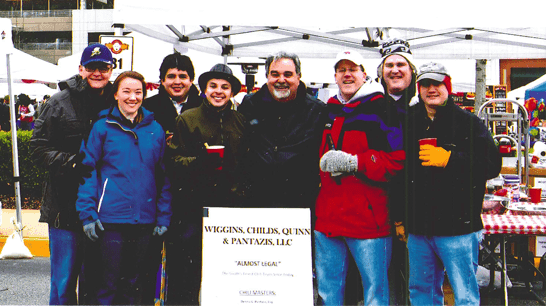Month: February 2018

REYNOLDS V. ALABAMA DEPARTMENT OF TRANSPORTATION – FREQUENTLY ASKED QUESTIONS
1. What is the purpose of the Notice sent by the Court in the case of Reynolds v. Alabama Department of Transportation?
The purpose of the Notice was to inform you that you should no longer rely upon the class action against hiring discrimination known as Reynolds v. Alabama Department of Transportation because that class has been decertified. As a result, the Notice tells you that you must now file your own EEOC Charge if you believe you have a valid claim of race discrimination in hiring against the Transportation Department (formerly known as the Highway Department), or against the Alabama Personnel Department or both.
2. What am I required to do if I believe I was not hired by the Transportation Department because of my race and want to pursue a claim for such racial discrimination?
You must file an EEOC Charge with the Equal Employment Opportunity Commission within 180 days of January 6, 2016 or the date you received or read the Notice from the Court, whichever is later. To be safe, you should treat 180 days from January 6, 2016 as your deadline.
3. What is the time period for which an EEOC Charge can be filed against racial discrimination in hiring?
You may file such an EEOC Charge for racial discrimination in hiring for any Transportation Department jobs you applied for and did not receive since May 21, 1979. This is explained more fully in the Court’s Notice that is attached here. You are also eligible to file such an EEOC Charge if you did not apply for a job that you wanted but would have done so in the absence of a history of racial discrimination by the Transportation and/or Personnel departments.
4. Will the attorneys who represented the hiring class in the Reynolds v. Alabama Department of Transportation case be available to help me draft an EEOC Charge?
Yes if you applied or would have applied for an engineering job higher than the engineering assistant jobs, but not for non-engineering jobs and engineering assistant jobs because of the large number of applicants involved. It is impossible for one law firm to provide individual help in drafting EEOC Charges to such a large number of applicants. The civil engineering jobs also have more complicated issues that require a knowledgeable attorney to draft an adequate EEOC Charge. This FAQ provides sufficient information to assist in drafting an EEOC Charge for non-engineering jobs.
5. If I applied for an engineering job higher than the engineering assistant jobs, how do I obtain assistance from the law firm who has been representing the hiring class in the Reynolds case?
Send an email stating your name, social security number, street address, e-mail address, telephone number and the name of the engineering job you applied to the following email address stating what engineering job you applied for: reynoldshiring@wigginschilds.com. Send a letter if you don’t have email.
6. What is an EEOC Charge?
An EEOC Charge is a standardized form of the federal agency that is responsible for investigating claims against racial discrimination in employment opportunities. A copy of such form is located here. You can also obtain the same form from the offices of the Equal Employment Opportunity Commission located at the following offices in Alabama:
Birmingham Office:
Equal Employment Opportunity Commission
Ridge Park Place, Suite 2000
1130 22nd Street South
Birmingham, Alabama 35205
Telephone: 1-800-669-4000
Fax: 205-212-2105Mobile, Alabama Office
Equal Employment Opportunity Commission
Suite 504
63 South Royal Street
Mobile, Alabama 36602
Telephone: 1-800-669-4000
Fax: 1-251-690-2581Q: How do I file an EEOC Charge?
7. How do I file an EEOC Charge?
Once you obtain the EEOC Charge form from this website or from the EEOC itself, fill-out the information requested on the form, sign it and mail or hand deliver the form to the EEOC at one of the addresses listed above.
Instructions for filing a charge at the Birmingham office are found at http://www.eeoc.gov/field/birmingham/charge.cfm.
Instructions for filing a charge at the Mobile office are found at http://www.eeoc.gov/field/mobile/charge.cfm.
8. Can I find information from the EEOC on my computer?
Yes. The EEOC’s Birmingham office may be reached at: http://www.eeoc.gov/field/birmingham/index.cfm. The EEOC’s Mobile office may be reached at: http://www.eeoc.gov/field/mobile/index.cfm.
9. Where can I learn what the Notice from the Court says?
It is included here and was published on January 6, 2016 in the following newspapers:
Huntsville Times
Birmingham News
Montgomery Advertiser
Mobile Press Register
10. Who is eligible to file an EEOC Charge?
You are eligible to file an EEOC Charge if you are an African-American who applied with the Alabama Personnel Department for a job with the Alabama Transportation Department or Highway Department in the absence of racial discrimination between May 21, 1979 and 2015 AND believe that racial discrimination may have adversely affected your chance of being hired. You are also eligible to file such an EEOC Charge if you did not apply for a job that you wanted but would have done so in the absence of a history of racial discrimination by the Transportation and/or Personnel departments.
11. If I was eventually hired by the Transportation Department or another state agency, am I still eligible to file an EEOC Charge?
Yes. You may file an EEOC Charge for the delay in your hiring or for not hiring you into another job besides the one you sought or really wanted. As with any other hiring discrimination claim, you would have to prove that your race played a role in such delay, or in your being hired for a job other than the one you sought or wanted.
12. What resources or assistance will I have available if I file an EEOC Charge?
The EEOC can request or subpoena documents and data from the Transportation and Personnel departments, as well as require them to file an answer to your claim and other information. You would also have the advice and assistance of an attorney if you hire one.
13. What will I be awarded if it is determined that I was not hired because of my race?
You could be awarded one or more of the following remedies: backpay, compensatory damages, punitive damages, and placement into the job you sought with retroactive pension, seniority, promotions and other benefits necessary to put you in the same status you would have enjoyed if race had not been a factor. Your attorney’s fees and expenses could also be reimbursed.
14. What should my EEOC Charge state if I believe that I was not hired because of my race or that my race adversely affected my chance of being hired?
You should state whatever facts that cause you to believe that your race affected your chance of being hired. At a minimum you would probably want to state whether you applied, how you were qualified and that you were not selected for the job you sought or wanted. It also helps to state any other facts you believe to be true. This may include such things as how you ranked on the register, what made you qualified, whether African-Americans had been able to obtain such jobs in significant numbers during the period you applied, and other facts like those addressed in the district court’s decisions and plaintiffs’ Complaints in Reynolds v. Alabama Department of Transportation linked here.
15. Is there anything I can read from the Court records which explains the types of facts and claims addressed by the Court in the case of Reynolds v. Alabama Department of Transportation?
Yes, for engineering jobs the Court’s decision explaining the racial discrimination which occurred in hiring for those jobs is available here. For other jobs, you may want to read the Complaints in the Reynolds case that are linked here.
16.Why does the Notice that I received state that I am “no longer represented by legal counsel in connection with this lawsuit”?
Like all attorneys, the law firm which represented the hiring class before it was decertified cannot commit to represent individuals for whom the law firm knows nothing about the merits of their claims. Nor can it represent individuals who have not requested to be represented by such firm. However, special assistance in drafting an EEOC Charge will be given to applicants for engineering jobs higher than the engineering assistant jobs. See Questions 4 and 5 above.
17. What should I do if I want the law firm who represented the hiring class in the Reynolds case to considerrepresenting me as an individual regarding my EEOC Charge?
If you applied for an engineering job above the engineering assistant jobs, you should e-mail the law firm and state what engineering job you applied for or wanted. If you applied only for non-engineering job, you should mail a copy of your completed and filed EEOC Charge to the attorneys for the hiring class at the following address:
Wiggins Childs Pantazis Fisher & Goldfarb
The Kress Building
301 North 19th Street
Birmingham, Alabama 35203
However, you should not rely upon or consider such law firm to be your attorney unless it notifies you in writing that you have been accepted as a client. Until then, you are not represented by the law firm of Wiggins Childs Pantazis Fisher & Goldfarb and should be sure to file your EEOC Charge by your deadline.
18. Will I automatically be contacted or represented by an attorney?
No, do not assume that any attorney will contact you or will act on your behalf unless you have an agreement with a specific attorney to represent you as an individual. You should make sure such agreement is documented in writing or in a contract. Otherwise, you should carefully follow the instructions you were given in the written Notice you received and that are repeated here.
19. If I call the telephone number of the law firm listed in the Court’s Notice, will I be called back or allowed to speak to an attorney?
Not necessarily. More than 29,000 persons were mailed Notice of their right to file a new EEOC Charge, so you should not expect to receive a return phone call or to speak on the telephone with the law firm listed in the Notice. That law firm has provided answers in this set of frequently asked questions as an alternative. If you still have a question after reading these questions and answers on the website, you will need to write it down and mail or e-mail it to the law firm’s address shown in the Notice you received or read in the newspaper To be safe, you should not wait upon or expect to receive an answer to your question before the deadline for filing an EEOC Charge.
20. What should I do if I want some other law firm or attorney to represent me?
You should contact such attorneys or law firm right away so that they can decide whether they are willing to represent you.
21. Do I need an attorney to file an EEOC Charge?
No, but you probably would be wise to seek the assistance or advice of an attorney if one is available and willing to take your case.
22. What kind of hiring claims can be presented or included in an EEOC Charge?
You may file a claim of intentional racial discrimination in hiring and/or a claim for unintentional racial discrimination in hiring which is known as a “disparate impact” claim.
23. The Notice I received states that I may “choose to pursue an individual hiring discrimination lawsuit against one or more of the Departments under an appropriate theory of law.” What is an “appropriate theory of law”?
Appropriate theories of law include claims of intentional disparate treatment in hiring and unintentional disparate impact in use of hiring procedures or criteria that adversely affect African-Americans more heavily than non-African Americans.
24. What must I do to prove my claim if I file an EEOC Charge for hiring discrimination against the Alabama Transportation Department and/or the State Personnel Department?
To establish intentional discrimination, you must at least prove that you applied or would have applied for hiring in the absence of racial discrimination, that you were qualified for the job you sought or was interested in, that you were not hired and that the defendants continued to look for or hire persons of your same or similar general qualifications. To establish a disparate impact claim, you would not have to prove intentional discrimination, but would have to prove that the hiring procedures or criteria used by the defendants adversely impacted African-Americans more heavily than non-African Americans.
25. Has a court or anyone else determined that I have a valid claim?
No. The EEOC will investigate your claim. It may or may not agree with you that race discrimination played a role in your not being hired. If you disagree with the EEOC, you have a right to request a Right-To-Sue letter and take your claim to federal court.
26. Can the EEOC require the Transportation Department to hire me or pay me backpay?
The EEOC can investigate Charges and mediate settlement, but cannot by itself order the Transportation or Personnel departments to hire someone or to pay damages or backpay. The EEOC must seek such relief from a federal court unless a settlement is agreed to by you and the Transportation or Personnel departments.
27. What are the expenses I might incur if I file an EEOC Charge?
There are no expenses for filing an EEOC Charge.
28. Will I have to go to Court if I file an EEOC Charge?
You will not have to go to Court if your case is settled or dropped at the EEOC stage. If it is not resolved at the EEOC, you will have to then decide whether you want to take your case to Court based on what you learn from the EEOC proceeding or your attorney.
29. Are hiring discrimination claims limited to the type of claim handled by the EEOC?
No. You also have the right to file a claim of racial discrimination in hiring in federal court pursuant to a separate civil rights statute known as 42 U.S.C. §§ 1981 and 1983. Filing an EEOC Charge does not stop the statute of limitations from running on this type of claim. Only a Complaint filed in court is sufficient to commence this type of hiring discrimination claim. Examples of this type of Complaint are located here.
30.What is my deadline for filing that type of §1981 or §1983 claim?
You should consult an attorney to determine such deadline because it involves difficult questions of law and fact. You would be well advised to do so as soon as possible.
31.What kind of hiring discrimination is the State Personnel Department responsible for?
The Alabama Personnel Department is the agent of the Alabama Transportation Department and is responsible for racial discrimination in hiring for jobs that are subject to the merit system administered by the Personnel Department, including, but not limited to, recruiting, testing, ranking, screening, selecting, appointing, reclassifying applicants or employees, and establishing procedures and criteria used in hiring employees for the Transportation Department.
32. Are there expenses if I take my case to Court?
Yes, the Court charges a filing fee and your attorney may need your assistance in paying for other expenses, such as court reporters for depositions, copying documents, etc. If you win, the defendants will probably have to reimburse you for such expenses, but not if you lose. If you lose your case, you must pay the defendants’ costs.
33. If I did not receive the Notice by mail, am I still eligible to file an EEOC Charge?
Yes. Many eligible class members will receive Notice only though publication in newspapers or by word of mouth. If you are an African-American who applied with the Alabama Personnel Department to be hired for a job with the Alabama Department of Transportation between May 21, 1979 and 2015 and believe you were not hired in whole or in part because of your race, then you are eligible to file an EEOC Charge regardless of whether you received the Notice of such right by mail.
34. Who was sent the Notice by mail?
The Notice was sent to African-Americans who applied to be hired by the Alabama Department of Transportation and who previously filed a claim with the Court indicating that they wished to be included in the class action against hiring discrimination known as Reynolds v. Alabama Department of Education. All other persons were given Notice by publication in newspapers.
35. The Notice I received states that “failure to file an EEOC Charge within 180 days or receiving this Notice may keep [me] from filing a Title VII lawsuit”, how do I determine the date of that deadline?
You should keep a record of the date you receive the Court’s Notice in the mail, including the envelope and Notice itself. If you did not receive a mailed Notice, you should keep a good record of the date you first saw the Notice in the newspaper or otherwise learned about it.
36. What if I was hired by the Alabama Department of Transportation before May 21, 1979?
If you were hired by the Alabama Department of Transportation before May 21, 1979 in the job you were seeking, you do not have a timely claim and should not file an EEOC Charge. The limitations period was suspended only for hiring claims arising after May 21, 1979. However, if you were hired by the Alabama Department of Transportation before May 21, 1979 into a job different than the one you sought or wanted, you may still file an EEOC Charge for the job you sought and were not hired into.
37. Can I file an EEOC Charge for claims other than racial discrimination in hiring, such as promotion discrimination or harassment claims?
No, not unless such discrimination occurred less than 180 days before January 6, 2016.
38. If I am among the original 85 class members who testified at the trial in Reynolds in 1992 and 1997 in the Reynolds case, does the Notice affect me?
The claims of those persons who testified in the original trial in 1992 and 1997 remain pending before Judge Thompson and they do not have to file an EEOC charge or a new lawsuit. If you were on a witness list but did not testify, you must file an EEOC charge or a new lawsuit.
39. Does this Notice affect claims for contempt of the Reynolds Consent Decree?
The Notice does not affect pending claims for Contempt of the Consent Decree. Contempt Claims that have not been dismissed remain pending before Judge Thompson. Contempt claims are for violating the consent decree and are different from hiring claims.

HIRING CLAIMS IN REYNOLDS V. ALABAMA DEPARTMENT OF TRANSPORTATION
This section of our website is designed to provide information to former members of the hiring class in Reynolds v. Alabama Department of Transportation. The hiring class in Reynolds v. Alabama Department of Transportation included all African-Americans who claim they were denied hiring opportunities with the Alabama Department of Transportation on the basis of race at any time since May 21, 1979.
The information in this website does not apply to persons who claim only that they were denied a promotion. This website is designed only for informational purposes and should not be construed as an agreement by any attorney or law firm to represent you. To protect your rights and interests, you must carefully follow the instructions in the written Notice that you received by mail or newspaper.
The FAQs (frequently asked questions) in the links above provide additional information but it is your responsibility to follow the instructions in the Notice and you must file an EEOC Charge by the 180-day deadline stated in the Notice provided by the Court if you choose to pursue your claim.

NOTICE of RIGHT TO JOIN COLLECTIVE ACTION IN RAVEN WILLIAMS, ET. AL. V. ROBERT OMAINSKY AND FRIED, STEWED, NUDE, INC.
DOWNLOAD CONSENT FORM DOWNLOAD CLASS CERTIFICATION ORDER
Mouse over document to reveal navigation arrows. Click Right and Left arrows to change pages.
[wonderplugin_3dcarousel id=2]

ATTORNEYS INVESTIGATING WAGE THEFT IN CAR DEALERSHIPS

If you are a car salesman, paid straight commission, no guaranteed draw or no guarantee of earning weekly minimum wage ($7.25 per hour) for each hour worked during the work week, and there were/are pay periods wherein you did not earn minimum wage based on the number of hours you worked for the week, then you are possibly due monetary damages for each and every weekly violation.
FORM SCRIPT

PRESIDENT OBAMA SIGNS THE LILLY LEDBETTER FAIR PAY ACT
“On January 29, 2009, with the new law’s namesake Lilly Ledbetter there to witness, President Obama signed into law the Lilly Ledbetter Fair Pay Act — legislation to fight pay discrimination and ensure fundamental fairness to American workers.”

NELA APPLAUDS LILLY LEDBETTER’S COUNSEL
National Employment Lawyers Association Applauds Lilly Ledbetter’s Cousel
Wiggins Childs Quinn & Pantazis, LLC
“Lilly could have accepted her lot and moved on. She could have decided that it wasn’t worth the
hassle and the harassment that would inevitably come with speaking up for what she deserved.
But instead, she decided that there was a principle at stake, something worth fighting for. So she
set out on a journey that would take more than ten years, take her all the way to the Supreme
Court of the United States, and lead to this day and this bill which will help others get the justice
that she was denied.”
–President Barack Obama, in remarks at the signing ceremony for the
Lilly Ledbetter Fair Pay Restoration Act on January 29, 2009.
http://www.whitehouse.gov/blog_post/AWonderfulDay/
Along with millions of people across the country, NELA celebrated the passage of the Lilly Ledbetter
Fair Pay Restoration Act last Thursday, January 29, 2009. NELA and its coalition partners, including
Lilly Ledbetter herself, worked hard to help beat back several efforts that would have weakened the
legislation.
Many have been acknowledged for making the new Ledbetter law possible, but NELA would be
remiss if we did not recognize the tireless efforts of Lilly Ledbetter’s legal team, Wiggins Childs
Quinn & Pantazis, LLC (Birmingham, AL), who championed Lilly’s case for ten years. Under the
direction of lead counsel Jon Goldfarb, they fought for Lilly, winning at trial only to lose on appeal in
the U.S. Court of Appeals for the Eleventh Circuit, and then losing by a narrow 5-4 decision in the
U.S. Supreme Court in 2007.
Lilly’s journey – and indeed the Ledbetter law itself – would not have been possible without the years
of commitment and devotion of Wiggins Childs to the cause of equality and justice in the American
workplace.
Although the Ledbetter bill will not undo the years of injustice Lilly faced, or restore the earnings to
which she deserved, we applaud and thank Wiggins Childs for charting the course for this ultimate
victory for all of America’s workers

NLRB PROPOSES TO REQUIRE ALL COVERED EMPLOYERS TO POST A NOTICE CONTAINING NLRA RIGHTS
Excert taken from The Labor and Employment College
Full article can be seen at World Blog
“EMPLOYEE RIGHTS UNDER THE NATIONAL LABOR RELATIONS ACT
“The National Labor Relations Act (NLRA) guarantees the right of employees to organize and bargain collectively with their employers, and to engage in other protected concerted activity. Employees covered by the NLRA* are protected from certain types of employer and union misconduct. This Notice gives you general information about your rights, and about the obligations of employers and unions under the NLRA. Contact the National Labor Relations Board (NLRB), the Federal agency that investigates and resolves complaints under the NLRA, using the contact information supplied below, if you have any questions about specific rights that may apply in your particular workplace.
“Under the NLRA, you have the right to:
• Organize a union to negotiate with your employer concerning your wages, hours, and other terms and conditions of employment.
• Form, join or assist a union.
• Bargain collectively through representatives of employees’ own choosing for a contract with your employer setting your wages, benefits, hours, and other working conditions.
• Discuss your terms and conditions of employment or union organizing with your co-workers or a union.
• Take action with one or more co-workers to improve your working conditions by, among other means, raising work-related complaints directly with your employer or with a government agency, and seeking help from a union.
• Strike and picket, depending on the purpose or means of the strike or the picketing.
• Choose not to do any of these activities, including joining or remaining a member of a union.
“Under the NLRA, it is illegal for your employer to:
• Prohibit you from soliciting for a union during non-work time, such as before or after work or during break times; or from distributing union literature during non-work time, in non-work areas, such as parking lots or break rooms.
• Question you about your union support or activities in a manner that discourages you from engaging in that activity.
• Fire, demote, or transfer you, or reduce your hours or change your shift, or otherwise take adverse action against you, or threaten to take any of these actions, because you join or support a union, or because you engage in concerted activity for mutual aid and protection, or because you
choose not to engage in any such activity.
• Threaten to close your workplace if workers choose a union to represent them.
• Promise or grant promotions, pay raises, or other benefits to discourage or encourage union support.
• Prohibit you from wearing union hats, buttons, t-shirts, and pins in the workplace except under special circumstances.
• Spy on or videotape peaceful union activities and gatherings or pretend to do so.
“Under the NLRA, it is illegal for a union or for the union that represents you in bargaining with your employer to:
• Threaten you that you will lose your job unless you support the union.
• Refuse to process a grievance because you have criticized union
officials or because you are not a member of the union.
• Use or maintain discriminatory standards or procedures in making job referrals from a hiring hall.
• Cause or attempt to cause an employer to discriminate against you because of your union-related activity.
• Take other adverse action against you based on whether you have joined or support the union.
“If you and your co-workers select a union to act as your collective bargaining representative, your employer and the union are required to bargain in good faith in a genuine effort to reach a written, binding agreement setting your terms and conditions of employment. The union is required to fairly represent you in bargaining and enforcing the agreement.
“Illegal conduct will not be permitted. If you believe your rights or the rights of others have been violated, you should contact the NLRB promptly to protect your rights, generally within six months of the unlawful activity. You may inquire about possible violations without your employer or anyone else being informed of the inquiry. Charges may be filed by any person and need not be filed by the employee directly affected by the violation. The NLRB may order an employer to rehire a worker fired in violation of the law and to pay lost wages and benefits, and may order an employer or union to cease violating the law. Employees should seek assistance from the nearest regional NLRB office, which can be found on the Agency’s website:
You can also contact the NLRB by calling toll-free:
1-866-667-NLRB (6572) or (TTY) 1-866-315-NLRB (1-866-315-6572) for hearing impaired.
“*The National Labor Relations Act covers most private-sector employers. Excluded from coverage under the NLRA are public-sector employees, agricultural and domestic workers, independent contractors, workers employed by a parent or spouse, employees of air and rail carriers covered by the Railway Labor Act, and supervisors (although supervisors that have been discriminated against for refusing to violate the NLRA may be covered).
“This is an official Government Notice and must not be defaced by anyone.”
According to the press release, “[p]ublic comments are invited on all aspects of the proposed rule, including the issue of the Board’s authority raised by the dissent, and should be submitted within 60 days of publication in the Federal Register, either electronically to www.regulations.gov, or by mail or hand-delivery to Lester Heltzer, Executive Secretary, NLRB, 1099 14th Street NW, Washington DC 20570.”

RACE DISCRIMINATION TRIAL STARTS IN MOBILE
“Five black men who worked for Austal USA in Mobile took their racial discrimination lawsuit to federal court Monday, opening a 2-week civil trial. The plaintiffs, who seek unspecified damages, are among 22 people who made racial discrimination claims against the shipbuilder, which is the city’s largest industrial employer. They accused the company of allowing a hostile work environment, filled with slurs, nooses and threatening graffiti.”
–Brendan Kirby, Press-Register
Please see the full article at AL.com

SEXUAL HARASSMENT AND RACIAL DISCRIMINATION LAWSUIT AGAINST ASU VERDICT RETURNED
Ms. McGowan represented three plaintiffs in a discrimination lawsuit against Alabama State University for claims of racial and sexual harassment and retaliation. The plaintiffs alleged that they were subjected to a racially and sexually hostile work environment from their supervisors, which included being called various forms of the “N” word and being subjected to other racially and sexually hostile conduct. The plaintiffs also alleged that they were retaliated against, including termination for two of them, after they made complaints of discrimination. The jury returned a verdict for all three plaintiffs in an amount totaling $1,039,119.30
You can find out more at
Sexual, racial harassment trial against ASU begins (Montgomery Advertiser)

EXCEPTIONAL FOUNDATION CHILI COOK-OFF
Lawyers at Wiggins, Childs, Quinn & Pantazis, LLC participated in the 2013 Exceptional Foundation Chili Cookoff, helping raise over $200,000 to benefit social and recreational programs for mentally and physically challenged individuals. Led by Head Chef Dennis Pantazis, the team consisting of Brian Clark, Craig Lowell, Rocco Calamusa, Daniel Arciniegas, Kimberley Sanders, and Kurt Kilpatrick, cooked hot and delicious chili while braving a barrage of snow flurries. Unfortunately, the WCQP chili did not win any awards, but we will be back next year with a new and improved recipe!
Check us out (and some more of the pictures from this great event) on facebook at www.facebook.com/wcqpllc

L to R (Kurt Kilpatrick, Kimberley Sanders, Daniel Arciniegas, Nico Arciniegas, Dennis Pantazis, Brian Clark, Craig Lowell, Rocco Calamusa
